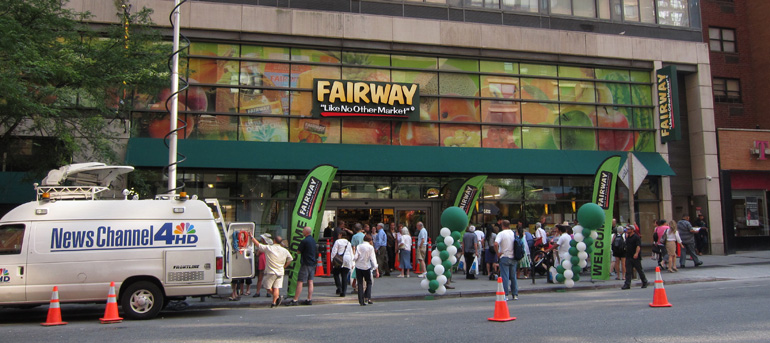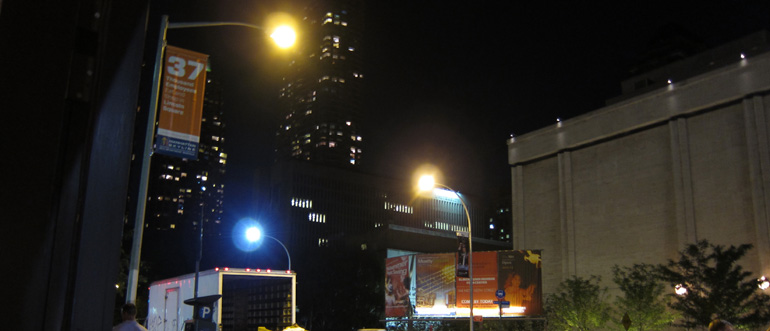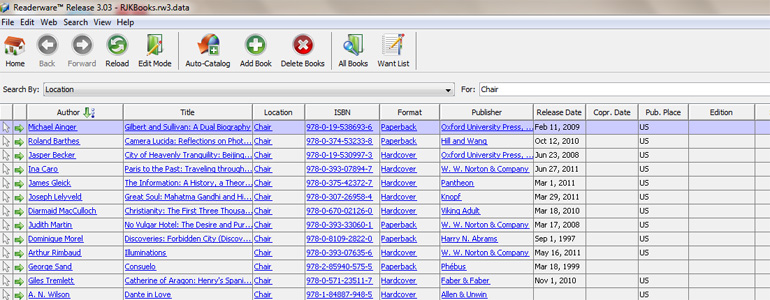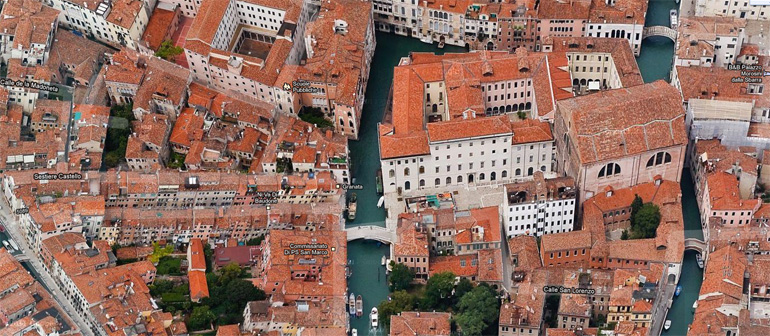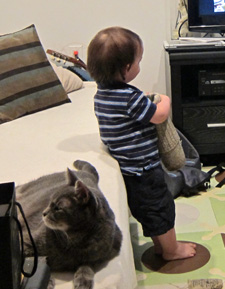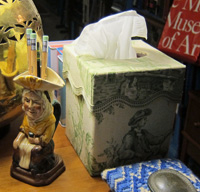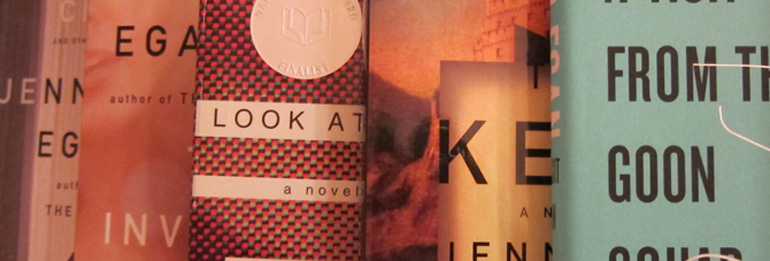Gotham Diary:
Opening Day
20 July 2011
Wednesday, July 20th, 2011
Right on schedule, Fairway opened its latest branch here in Yorkville today, and I paid the first of Nn visits. I bought two items, a quart of milk (needed) and a pound of Kona (also needed). Getting a pricetag for the Kona was problematic; in fact, it was impossible. The computer wouldn’t recognize the PLU. So the clerks and the sub-manager devised a sort of written math problem involving two vessels — don’t ask me, but Ray Soleil thought that it was pretty clever. In case you’re wondering, the Kona is not a bargain, at $39.95; late, lamented Rohr’s, the tea- and coffee-shop that closed a month or so ago, used to sell it for $31. But Rohr’s isn’t in business anymore, is it? Before he ran into the computer problem, the clerk wanted to be sure that I knew how much the coffee was going to cost. What can one do? It’s the best coffee on earth.
The closest I have ever come to a Fairway store in the past is as a years-long FreshDirect customer. FreshDirect was founded, I believe, by a former Fairway partner who left in a huff to start his own business, or words to that effect. But a little of the Fairway gloss glittered on my FreshDirect boxes. FreshDirect used to sell Kona, but it stopped, just as it stopped selling a lot of the special groceries that kept me coming back. Finally it was no better than the brilliant specialty markets that have been in the neighborhood for years, Agata & Valentina and Eli’s. By that time, I’d learned that the last thing I needed was boxes of food delivered once a week. I need small bags of food purchased every day. Every day. I won’t mind, now that there’s Fairway.
On the way home, neighbors on a lower floor who have for years been regular customers at the mother ship, on the West Side, assured me that it’s always going to be like that in there, meaning crowd scenes suggestive of a bus station in an earthquake, with just a hint of menace that the whole place is about to flip over like the Poseidon. I predict that guidebooks will soon be directing Museum tourists to the other end of 86th Street, before or after the art, for a look at New Yorkers in the raw. By local standards, Fairway is immense, with sky-high shelves stocked with unimaginable variety — unimaginable to Manhattanites, that is. What’s on the shelves will only elicit yawns from sophisticated out-of-towners, especially those within driving distance of a Wegman’s. But the clientèle may take their breath away. If opening day is any indication, the West Side store’s celebrated atmosphere of crazed-grandmas-on-steroids-death -match-roller-derby has been piped into the new store as well.
No matter how hard you beg, the clerks are not going to let you leave by the entryway. You have at least to go around the produce shelves and past the checkout counters. I had hardly walked in when I heard at least two whimpering young men all but pleading entrapment, as though they’d stepped through the door unaware that food was for sale (surely anyplace so happening — see that TV truck? — must be selling Apples) and now wanted only to turn on the heels. Not allowed!
It’s not the exotic variety that I’m after. I don’t mind walking a few blocks to buy something unusual. What I want right across the street, when I need it because, damn it, I thought I had another bottle in the cupboard — and am now going to get — is superb produce and amply-stocked staples. Fairway has turned the local Food Emporium, and, to a lesser extend, the better-run Gristede’s, into dodgy convenience stores. Indeed, I can’t imagine how Food Emporium will last a year. We shall see.
I was not too superior to accept one of the maps that those exit-forbidding clerks were handing out. The key to the aisles has three columns, “traditional,” “organic,” and “specialty.” There’s a kind of honey in each category, and they’re all in different parts of the lower level (along with a tripartition of jams). There are also sodas in all three categories. But what about “specialty organic”? Don’t tell me that Fairway is missing something!
Next Day Update: This time, I went to shop, with a list of ingredients for dinner. I stuck to it, too; the only extras were a ripe avocado (ready to eat! what a concept!) and some of Kathleen’s preferred yoghurt. Some of the items on my list were “specialty” — wild rice, for example — while I was also on the lookout for “traditional” (that is, ordinary) ice cream bars and fruit pops. And then, some beautiful green beans and small button mushrooms. I can’t remember the last time that everything on my list — even a short one like today’s — could be purchased under one roof. And the bill came to pennies more (pennies!) than the cost of a pound of Kona. (A quarter of that went for the wild rice.)

